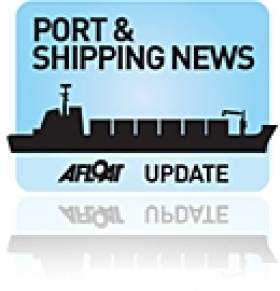Displaying items by tag: Arklow Beacon
Beacon Brings Bumper Harvest For UK Port’s Record
#HarvestCargo - The UK’s number one grain exporting port, ABP's Port of Ipswich, has handled more than one million tonnes of grain in the 2015/16 harvest year, a record total for the port and its customers.
In the last 12 months 750 ships (including Arklow Beacon) have called to Associated British Ports /ABP Port of Ipswich, thats a 17% increase from the previous harvest year. The Arklow Beacon which made her maiden call to Dublin last year has a total grain capacity of 9902,6m³
Such grain cargoes are the 'bread and butter' of Arklow Shipping whose 'B' class cargoship was completed in 2014 at Ferus Smit's Dutch yard that launched the first of 10 newbuilds, Arklow Cadet in June this year.
In the last harvest year, which ended on 30 June 2015, approximately 1,093,481 tonnes of grain were handled trhough Ipswich, surpassing the previous best year in 2009/10 where 933,000 tonnes passed through the port. It’s also a third increase on last year’s total of 822,448.
In the first half of 2016 alone, 563,760 tonnes of grain were exported from the Port of Ipswich - an increase from the first half of 2015 which saw 368,795 tonnes exported.
ABP Short Sea Ports Director, Andrew Harston said: “The tonnage of grain we have seen handled at the Port of Ipswich in the recent harvest year signifies the importance of the East Anglian farming community.
“Britain has always had a strong role in exporting grains such as wheat to the rest of Europe. But following a steady grain season and the recent decline in the value of sterling, the export of wheat and other grain commodities has never been more competitive.
“Our customers Nidera and Clarkson Port Services, who operate the Ipswich Grain Terminal and Sentinel Terminal respectively, have seen tremendous results this year and we look forward to working with them to ensure further success in the 2016/17 year.”
Arklow’s New ‘Green’ Cargoship Makes Maiden Call to Capital
#MaidenPortCall - Arklow Beacon, made her maiden port of call to Dublin Port this weekend, the second newest 'B' class dry-cargoship of the Arklow Shipping fleet, had docked loaded with slag from Spain, writes Jehan Ashmore.
The 8,660 dwt Arklow Beacon's voyage across the Bay of Biscay began on Friday having departed Gijón in the Asturias region which forms part of 'Green' Spain.
She is the latest of six sisters, noting that second ship, Arklow Bay featured on Afloat.ie with a video voyage showing spectacular scenery of the Norwegian fjords.
Arklow Beacon has no bulbous bow, but to retain hull efficiency, her 119m hull form is optimised with 'green' credentials without compromising on cargo loadings. In addition the ships slender hull is designed to perform in varying sea-states.
As previously reported here on Afloat.ie, Arklow Beacon was launched last September and she began her career the following October.
She along with her sisters, were ordered for ASL's Dutch subsidiary, Arklow Shipping N.V. based in Rotterdam. It is also in the same country as to where the newbuilds were contracted to Ferus Smit's shipyard in Westerbroek.
The series are not to be confused with a pair of other ships beginning with 'B' names, the Arklow's 'Bridge' and 'Brook'. This pair were also Dutch built but by another yard, Bodewes Shipyards B.V. in 2011 and are in fact differently designed having a deadweight of 7,575 tonnes.
ASL 's combined fleet of Irish and Dutch flagged ships totals 45 vessels to date, the majority are registered in Arklow. The largest series in the fleet are those of the 'R' class series which number 15 vessels.
These 4,399dwt ships were all custom-built during 2002-2007, however what makes them differ to their fleet-mates is that they are the only same-ship series to fly both the Irish and Dutch flags.





























































